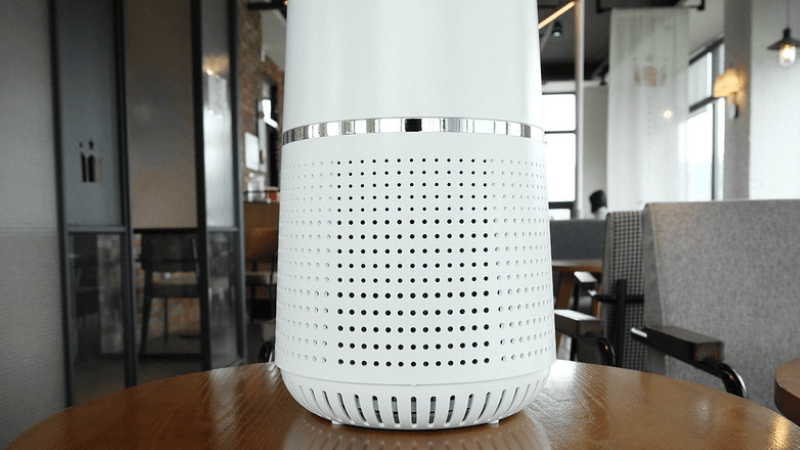Air purifiers come off as a top recommendation for anyone concerned with their indoor air quality. However, other people have no solid grounds to purchase an air purifier. This is especially considering the price of some air purifiers.
Are air purifiers a waste of money? While you ponder about buying an air purifier, in this article, I’ll give you the facts so you can make an informed decision. Enjoy.
[snippet]
No, air purifiers are not a waste of money. People often think it is safe indoors because most visible pollution only exists outdoors. However, the air quality in our homes or offices is even worse. According to EPA, the concentrations of some pollutants are often 2 to 5 times higher indoors than outdoor concentrations.
[/snippet]
Typical indoor pollutants include:
- Combustion byproducts such as particulate matter, carbon monoxide, and tobacco smoke.
- Volatile organic compounds (VOCs) from a variety of products and materials.
- Pesticides, lead, and asbestos.
- Substances of natural origin include dust, pet dander, radon, mold, and pollen.
- Ozone from using some air cleaners.
Most of these pollutants affecting indoor air come from indoor sources, although some like pollen or dust might originate outdoors.
You can do several things to improve the air quality in your home. However, air purifiers offer a quick and effective solution to indoor air pollutants. Whether an air purifier becomes an investment or a waste of money will depend on when and how you use it.
When to Use an Air Purifier
1. You Have Respiratory Issues, Allergies, or Asthma
According to NCCEH Canada, using a HEPA air purifier has been associated with reducing some asthma and allergy-related symptoms. An evaluation of HEPA air purifiers also shows that they can effectively clean particulate pollutants from the air.
The American Academy of Allergy, Asthma, and Immunology also states that air filter reduces airborne allergens and may provide some relief for people with allergies. They recommend looking for an air purifier with a HEPA filter or installing a MERV air filter in your HVAC system to turn it into a whole house filtration system.
2. You Have Pets in Your Home
Pet hair, dander, and odors can be from cats, dogs, rodents, birds, or other animals with fur or feathers. Even though some animals are hypoallergenic, they still produce dander to some degree, which can end up causing allergies.
There are air purifiers specifically made for pets. These can catch bigger airborne stuff like pet hair down to the microscopic pet dander. Some also come with carbon or charcoal filters that trap odors, which helps eliminate pet smells in your home. Though air purifiers can eliminate airborne particles, cleaning your home and bathing pets regularly can help the air purifier work effectively. Check out our guide on how to remove pet hair from air.
3. You smoke — or You Live With a Smoker
Cigarette smoke, even secondhand smoke, harms your health and can cause heart disease, lung cancer, and stroke. According to the CDC, since 1964, approximately 2,500,000 nonsmokers have died from health problems caused by secondhand smoke.
One way of improving indoor air quality is to ban smoking in your home. However, an air purifier can help trap cigarette particles and odors if you live with a smoker.
Though research suggests that HEPA filters are not 100 percent effective in cleaning smaller airborne particles, HyperHEPA filters can help with smaller microscopic particulate matter. Smaller microscopic particulates make up about 90 percent of all airborne particles. Unlike HEPA air purifiers, HyperHEPA filtration can trap even microscopic particles, including viruses, pet dander, dust mites, and even cigarette smoke.
The most notable HyperHEPA air purifier is the IQAir HealthPro Plus Air Purifier, which can stop small particles down to 0.003 microns.
4. You Live on a Busy Street or Around Construction
Dust is one of the common airborne particles that gets kicked up during Construction or as cars move down the road. Closing windows and doors can help minimize dust in your home. However, an air purifier will help stop dust that gets through the cracks and small openings around your home.
An air purifier can also be useful if you renovate a section of your home. Renting or buying a commercial-grade air scrubber is designed to draw in construction dust and can get rid of dust and other pollutants in the air. You may need to change the filters from time to time for better results.
[snippet]
How Often Should You Run Your Air Purifier?
When running an air purifier for the first time, it is best to turn it up to the maximum setting and run it for 30 minutes or 2-hours, depending on the size of the room. After that, you can set the air purifier to run at different intervals, say 2 or 3 hours, to help clean up the room. Instead of manually switching it on/off, get an air purifier with an automatic timer and set your preferred time interval to help clean up your home’s air.
[/snippet]
How to Get The Best Out of Your Air Purifier
Though air cleaners clean the air, they should be used as part of an effort to improve the air quality. You can do several other things in your home to make it easier for your air purifier to clean the air and to see the results.
1. Understand Your Needs
Different air purifiers serve different purposes. Choosing the wrong type of air purifier can damper the progress and make you feel like it is not doing anything. To get the most out of an air purifier, you must select the right type for the job.
A HEPA filter air purifier is needed for a particulate matter like dust, mold, or pollen. Choose an air purifier with an activated carbon filter for smoke and other odors.
Check out our post on the different types of air purifiers.
2. Buy the Right Size
Air purifiers are better at cleaning smaller spaces. Often, the room size is very neglected, leading to negative results when using an air purifier. When buying an air purifier, think about the space you want to put it in. Large models might move more air, but they might not effectively clean a larger room.
If you have a larger room or different rooms in your home, you might consider adding more than one air purifier or using an air purifier inside frequently used rooms like bedrooms. For a small area, a cheaper and portable model should work effectively.
3. Position the Air Purifier Close to the Source
If you have a smoker in your home, a dusty area, or a funky-smelling area, this is where you should place your air purifier. The closer the air purifier is to the Source of air contamination, the faster and better it will work. If dust comes through one of your windows, place the air purifier closer to that window.
Avoid placing the air purifier behind furniture or against the walls. Read our informative guide on air purifier placement.
4. Close Doors and Windows When Using an Air Purifier
Air purifiers work effectively when all doors and windows are shut. This enables the air purifier to clean the air in your home effectively without bothering about outside air. Clean air will escape if doors and windows are open, or the air purifier might pull more air from outside. This increases the load of the air purifier and also its electric consumption.
However, this does not mean you should not periodically open your windows or door. Just shut off the air purifier beforehand.
5. Replace filters on time for maximum efficiency
As time passes, the efficiency of air purifiers may decrease. Air purifiers are meant to clean the air. When the filter cannot function properly, the air purifier is useless. Replacing or maintaining the filter is all needed to keep the air purifier working effectively.
Depending on the air purifier, follow the manufacturer’s recommendation and guidelines on when and how to replace the air filters to ensure the air purifier is working optimally.
What An Air Purifier Cannot Do
Many people feel cheated when air purifiers fail to achieve or meet user expectations. However, people need to limit their expectations and understand air purifiers’ limitations. Below are some myths and misconceptions about air purifiers.
- You don’t have to clean your home regularly if you have an air purifier. This is one of the classic and most common misunderstandings about air purifiers. Air purifiers cannot replace dusting and cleaning your home. This is because air purifiers work only on airborne particles. An air purifier will not lift particles that settle on surfaces of furniture or the floor. You will still need to clean and vacuum regularly to remove settled dust and other pollutants.
- All air purifiers work more or less the same. Different air purifier technologies work differently. HEPA air purifiers will not work like ionizing air purifiers. Other than the different air purifier technologies, different air purifiers will work on different contaminants. HEPA air purifiers will better with particulate pollutants, while Carbon filter air purifiers will work with odors.
- Air purifiers can make all my allergies go away. While airborne particles like pollen and dust cause allergies, they are not responsible for all allergies. Allergies can also come from foods and also your lifestyle. Purchasing an air purifier will only minimize airborne allergens.
Air Purifiers Are a Worthy Investment
Are air purifiers worth it? Yes. However, users should understand how different air purifiers work and what type is best for their problems. Apart from using an air purifier, you can improve the air quality in your home by improving your home’s ventilation, cleaning and dusting regularly, and using a dehumidifier, among other things.



